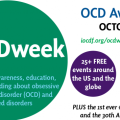Parenting Kids & Teens with OCD: Don’t Feed the Reassurance Monster…and Other Quick Tips

OCD is associated with an intolerance for uncertainty. Help your child by not feeding the reassurance monster.
Many excellent parents struggle with how to appropriately parent their child/teen with obsessive-compulsive disorder (OCD). Unfortunately, this process is rarely straightforward and is often counter-intuitive, which leaves many parents feeling anxious and confused.
As a psychologist in Palm Beach County, Florida, I work closely with kids, teens, and parents throughout the greater Palm Beach, Fort Lauderdale, and Miami areas on strategies for recovering from OCD. I also run a free support group for kids/teens with OCD. Consider the following set of ground rules for parenting your child with OCD. The strategies you adopt as a parent can mean the difference between reducing your child’s symptoms or giving these symptoms room to grow.
1. Remind yourself that OCD is based on emotion rather than logic. Many parents get tripped up and frustrated by the many illogical forms that OCD takes. If you consider OCD to be a logical process, you’ll inevitably become vulnerable to using lecturing and/or chastising as your primary intervention. However, if you correctly recognize that OCD is based on intolerance of doubt and uncertainty, it is much easier to implement behavioral strategies that are exposure-based and will decrease symptoms over time. One example of an exposure-based strategy might be eating dinner while intentionally making statements related to contamination. These might include, “Pass me the germy mashed potatoes” or “I hope the roast beef has extra e.coli tonight.” Although many people (with or without OCD) might be uncomfortable thinking about germs while eating, this strategy allows us to directly challenge OCD-related cognitions.
2. All primary caregivers (and all household members, if possible), should adopt consistent policies for responding to OCD. In two-parent households, parents must agree on how OCD-related situations will be addressed. If a child splits time among multiple households, it is critical that all primary caregivers implement similar strategies. Failure to adopt a consistent plan will likely increase your child’s anxiety, increase household conflict, and lead to splitting among caregivers.
3. Don’t “Feed the Reassurance Monster.” In most cases, regardless of the form it takes, OCD is about wanting certainty in situations that are fundamentally uncertain. When a child washes his or her hands repeatedly, he or she is trying to be certain that all potential germs have been eliminated. When a child repeatedly checks locks, he or she is trying to be absolutely certain about issues of safety. When we, as parents, repeatedly provide OCD-related reassurance, we make it more difficult for our children to learn to be content in an uncertain world. Examples of “Feeding the Reassurance Monster” include:
- “You won’t get sick–you’ve gotten all the germs off.”
- “Don’t worry. We live in a safe neighborhood, so no one is going to break into the house.”
When you avoid these types of statements, you help your child learn to better coexist with uncertainty.
4. Substitute honey for vinegar. Your child will be more motivated to work on fighting OCD if the process is collaborative and fun, rather than forced and coercive. Schedule regular exposure exercises and reward your child for his/her efforts. Therapists who specialize in treating OCD can give you specific suggestions for appropriate interventions.
5. Never participate in your child’s rituals. Just because your child has OCD doesn’t mean that you have to enable their symptoms. Recognize the sneaky ways in which OCD tries to pull you into the disease. Notice when OCD is trying to elicit reassurance from you, and hold your ground. Also recognize when OCD is trying to get you to check the locks, buy stronger antibacterial soap, or modify your cooking habits… Some vicarious OCD rituals are obvious but others can be quite subtle. Remember that OCD can be conceptualized as an addiction to certainty and that by participating in your child’s symptoms, you are feeding this addiction.
6. Understand why kids do rituals. The true function of a ritual is to change a feeling. In most cases, rituals are used to decrease feelings of anxiety, uncertainty, or vulnerability to potential threat. For example, in the case of washing rituals, rituals are driven by doubt (what if my hands aren’t clean?) rather than hygiene. This subtle difference becomes critical in the context of treatment.
7. Recognize the many forms that OCD takes. Kids and teens with OCD often have multiple OCD symptoms, and it’s important for you to be aware of the full extent of the problem. Remember, OCD can affect even desirable behaviors like homework completion. If your child is spending excessive time doing their homework (e.g., re-checking, re-reading, re-writing, or re-copying homework assignments), it might be a sign of OCD.
Remember that when it comes to conditions like OCD, early intervention is key. Investing some time and energy in fighting OCD as soon as you recognize it can pay huge dividends and offset many later problems. If you decide to pursue therapy, remember that exposure and response prevention (ERP) is the most effective treatment for OCD.
Agree? Disagree? Sound off below.
Want Updates about New Content?
Follow Me!
Follow @drstevenseay












Hello! I’m so intersected in the ERP method for my 10 yr son. He is in school but didn’t think he could make it because of the stress w/ the closeness of other children. Too he rarely w/ use the bathrooms. I want to encourage him to try and do the things though I have many times fallen into the traps. He constantly want reassurance from me! He is in therapy but she is not a COD therapist! Can u recommend one in Atlanta ? Or any good books on how to precede! I’m looking for tools not meds at the moment! Thank you. MOM
I feel you! I have high-functioning Asperger’s syndrome, and that can be very difficult.
Send him to the hall to gain control over his emotions [I’m currently an adolescent, but when I’m old enough to adopt OCD-diagnosed daughter from Azerbaijan–Sophia–as well as OCD-diagnosed daughter from China–Lily–the removal method for kids to gain control over their emotions is very effective].
Picture a scene with a normal mom and her OCD-diagnosed Chinese daughter she adopted and named Lily:
Mom: The reality is, germs are everywhere. This isn’t la la land! This is the real world, crud!
Lily: I’m washing my hands lots.
Mom: Oh my gosh, Lily, you’re putting too much soap!
Lily: I’m washing my hands lots.
Mom: Crud, Lily, you’re putting too much soap! [turns off water and sends Lily to the hall to get her to calm down].
Did you know that I am an adolescent with high-functioning Asperger’s syndrome? When I was four and in elementary school, I was diagnosed with severe autism. In middle school, I was diagnosed with moderate Obsessive Compulsive Disorder. Elementary school and junior high, therefore, were really tough for me.
Because I have high-functioning Asperger’s syndrome, changes can be very difficult, but they’re not as bad as when I was diagnosed with severe autism and later, moderate OCD.
I am a Christian, so when I grow up, I want to help an OCD-diagnosed girl, Sophia Comden, from Azerbaijan.